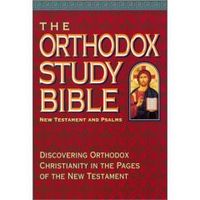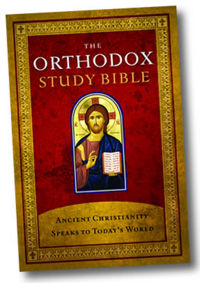Orthodox Study Bible
The Orthodox Study Bible is a translation and annotation of the Bible currently in production by clergy and laity within the Orthodox Church. The text of the New Testament and Psalms translation is currently the New King James Version accompanied by Orthodox viewpoint commentary. The Old Testament in the new edition, was translated from the Septuagint1 using the New King James Version as the template, and is accompanied by Orthodox viewpoint commentary.
Contents
Contents
The translation is put in the traditional Septuagint order with the last book of the Old Testament being Daniel in the translation instead of Malachi.
Throughout the translation various aspects of the Orthodox faith are shown to the reader such as morning and evening prayers, icons (12 icons included under heading “Illustrations”), lectionary, history of the Orthodox Church and general Christian history. The OSB is for those who are unfamiliar to the faith and is used as an aid in worship to those who are members of this ancient faith.
Versions
The first version, containing the Psalms and the New Testament, was published in 1993 by Thomas Nelson. It is currently being published by Conciliar Press.
The Old and New Testaments edition, subtitled "Ancient Christianity Speaks to Today's World" came out in February of 2008. It includes a new translation of the Psalms by Dr. Donald Sheehan of Dartmouth College.
Contributors
The Orthodox Study Bible was the result of a collaboration between numerous Orthodox scholars, clergy and lay leaders. The initial draft was prepared by the academic community of St. Athanasius Orthodox Academy. Some of the credited contributors of the Orthodox Study Bible project include:
- Project Director - Fr. Peter Gillquist
- Managing Editor - Mr. Alan Wallerstedt
- Special Consultant - Fr. Thomas Hopko
General Editors
- Joseph Allen, Th.D.
- Michael Najim, Ph.D.
- Fr. Jack N. Sparks
- Fr. Theodore Stylianopoulos, Th.D.
Editions
- New Testament and Psalms (hardbound): ISBN 9780840783912
- New Testament and Psalms (paperback): ISBN 9780718000301
- Full-length (hardcover): ISBN 9780718003593
- Full-length (bonded leather): ISBN 9780718019082
Reference
- 1 Orthodox Study Bible: Old Testament Project
- 2 What North American Hierarchs have said...
- 3 Archim. Ephrem's review in Sourozh
External links
- Orthodox Study Bible on Wikipedia
- The Official Conciliar Press Orthodox Study Bible site - full version
- Holy Orthodox Bible - Peter Papoutsis
- EOB: The Eastern / Greek Orthodox Bible
- Podcast Interview with Fr. Peter Gilquist, giving an update on the OSB
- Reviews of the complete Orthodox Study Bible
- Notes on the Orthodox Study Bible - a thorough critical review by Greek scholar R. G. Jones

